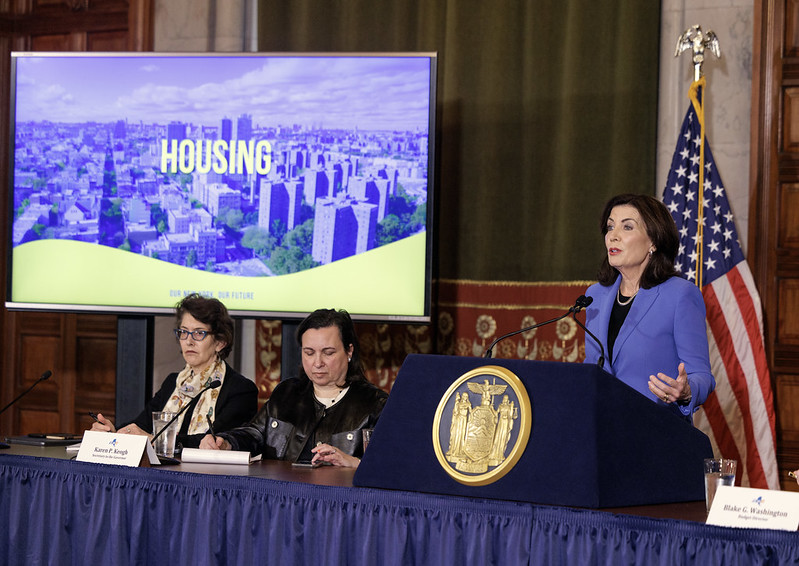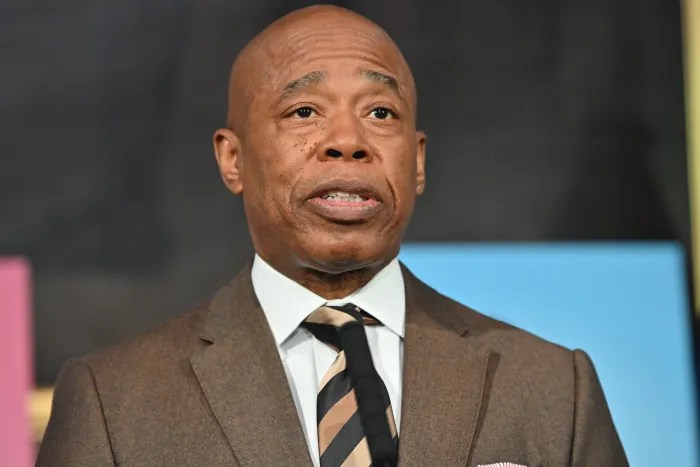Gov. Kathy Hochul on Wednesday said tenant advocates incensed by the modified version of “Good Cause Eviction” included in the burgeoning state budget deal she announced earlier this week should see it as “a win.”
During a Wednesday morning interview on WNYC’s The Brian Lehrer Show, Hochul defended the watered down version of Good Cause legislation included in the tentative budget deal, arguing it will impose stronger tenant protections than are currently in place.
“There’s always controversy. Everybody wants what they think is the perfect deal, but this is so much more than they had,” Hochul said. “I would take that as a win.”
While Hochul announced a “conceptual” budget deal on Monday night, many details of the Fiscal Year 2025 state spending plan still have to be worked out. Assembly Speaker Carl Heastie on Tuesday said the “pencils weren’t fully down” when Hochul made her announcement.
The original Good Cause legislation — introduced in 2019 by state Sen. Julia Salazar (D-Brooklyn) and Assemblymember Pamela Hunter (D-Syracuse) — aims to protect tenants by greatly limiting yearly rent hikes and narrowing the reasons for which landlords can evict them.
Where the original bill would cap rent increases at 3% or 1.5% of the Consumer Price Index (CPI), the modified version would cap yearly rent increases at either 10% or 5% plus the consumer price index.
Other modifications to the original legislation include making it opt-in for municipalities outside of New York City, instead of statewide, as well as exempting new construction, small owner-occupied buildings, landlords with small portfolios and units priced at 200% of federal fair market rent from the protections.
Tenant advocates say those carve-outs make the proposal the “weakest” version of Good Cause throughout the country and have urged lawmakers to vote against. Housing Justice for All, a coalition of tenant advocacy groups fighting for Good Cause and other protections, released a new analysis finding that the amended version of the legislation would exclude 3.4 million tenants across the state from the safeguards.
“Governor Hochul believes that 3.4 million New Yorkers don’t deserve to sleep soundly knowing they’ll be able to keep a roof over their heads,” Cea Weaver, the coalition’s leader, said in a statement. “Gov. Hochul’s Good Cause Eviction was written by the real estate industry to ensure that they can keep raking in record profits while New Yorkers struggle to afford the rent and stay in their homes.”
The Read Estate Board of New York has also come out against the measure — not because it was altered, but rather because it was included in the deal at all.
Advocates also argue the measure would be unenforceable because many tenants may not know if it covers them, due to it often being hard to determine how large a landlord’s portfolio is.
Even so, Hochul argued the version of Good Cause that advocates want would not get enough support from lawmakers to make it over the finish line. The legislation has failed to pass the legislation since it was first introduced five years ago.
“I’ve been in elective office for 30 years and what I know is that compromise is not a dirty word,” she said on April 17. “It does not mean that you’re selling out to get your foot in the door, to do something that the legislature … has not done until now because I’m not sure they have the votes, Brian. Because otherwise this would have been on my desk before. This was the only path.”
Heastie, during the Tuesday news conference, said he believes the version of Good Cause under discussion will apply to 90% of apartments in New York City. He also noted his chamber is discussing language to help tenants know if they are covered by the protections.
“We want tenants to know whether they are living in a household that is covered under tenant protections or not,” Heastie said. “So that’s one of the language things we’re trying to figure out.”
































